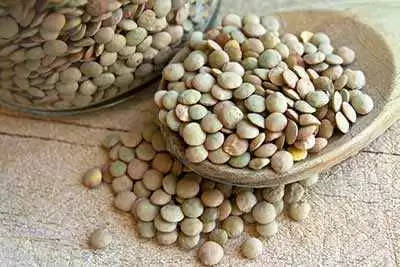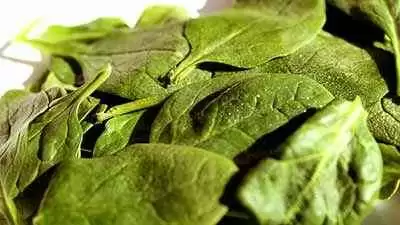
Celiac.com 12/01/2015 - Lectins are carbohydrate binding proteins which promote inflammatory responses like Crohn's disease, systemic lupus, asthma, and rheumatoid arthritis. They were discovered over 100 years ago and cause leaky gut and gastrointestinal dysbiosis yet the push for a plant-based diet focusing on legumes as meat alternatives has overlooked the damage lectins cause to the gut. Legumes offer inferior nutrition compared to animal proteins so toxicity needs to be considered when recommending food choices.
As carbohydrate binding proteins, lectins are difficult to digest and irritate the brush border of the small intestine. Consequently, the tight junctions of the microvilli are damaged by prolamin and agglutinins which can lead to numerous disorders of the gastrointestinal tract and autoimmune diseases. Lectins are also a major contributor to leptin resistance which contributes to obesity.
Celiac.com Sponsor (A12):
As described in The Handbook of Plant Lectins: Properties and Biomedical Applications (John Wiley, 1998), foods that contain these toxic lectins are members of the pea family and include peanuts, pigeon peas, soybeans, kidney beans, mung beans, lima beans, lentils, fava beans, chickpeas, carob, green and yellow peas. Green beans, snow peas and snap peas are usually well tolerated once the gut has been healed since they are immature protein sources with minor amounts of lectins.
Lectins are found in other foods including grains and pseudo-grains. Grains are seeds from grasses—barley, oats, rice, rye, millet, wheat, teff, corn, kamut, spelt and possibly wild rice. Many gastroenterologists believe that the detrimental affects of lectins in grains are a factor in the development of celiac disease. Genetics and frequent consumption possibly play a critical role in the severity of sensitivities to these foods.
Pseudo-grains are seeds from broadleafed plants—amaranth, buckwheat, chia, and quinoa. These seed products were geographically limited to specific populations and only available on a limited basis seasonally. But modern agriculture has greatly increased the consumption of these pseudo-grains because they can be labeled “gluten-free” because US standards allow any grain with less than 20 ppm gluten to be called gluten-free.
Omitting toxic lectins—prolamins and agglutinins—from the diet is critical for gut health. Prolamins are predominately found in the seeds of plants. Gluten is the most widely known source of prolamins. They get their name from the high content of the amino acid proline. Research studies have shown that the prolamins in quinoa, corn and oats can cause damage to the digestive tract in people with celiac disease, yet these grains are frequently included in a gluten-free diet.
Aggltinins are named for their ability to cause clumping of red blood cells. The most recent example of how this toxic lectin works is the bioterrorism threat caused from ricin. Ricin is the compound in castor beans that is so toxic that only tiny amounts are needed to cause death. Agglutinins are found on the seed coatings of grains and pseudo-grains and serve to protect the seed from fungus growth. Genetically modified crops—wheat, corn, soybeans—have higher amounts of agglutinins to insure higher yields.
A leaky gut is harmful to the innate and adaptive immune systems. Toxic lectins cause inflammation and induce cytokine production. As few as five soaked, uncooked kidney beans can lead to gut distress for the raw foodies while 1 tablespoon of peanut butter leads to peanut agglutinins entering the bloodstream soon after consumption.
Paolo Zatto and Pamela Zambenedetti from Padova, Italy studied lectins, microglia and Alzheimer's Disease (AD) as reported in Lectins and Pathology, 2000. The microglia of 10 AD brains stained intensely for agglutinins. Their research concluded that the glycation reaction seen in AD from lectins may serve as a significant factor in amyloid plaque development and disease progression.
Bacteria overgrowth in the gut is associated with a wide variety of diseases- septicemia, pulmonary infections, enteropathies. Adhesion of pathogenic bacteria to epithelial cells in the gut can be a critical first stage in the infectious disease process. Michele Mouricout and Bruno Vedrine of Limoges, France described how lectins cause adhesion of numerous bacterial strains to intestines, brain tissues, urinary tract, lung and corneal cells. Their research is reported in Lectins and Pathology, 2000 illustrates the mosiac effect of how agglutinins cause tissue damage.
Even though lectins have been identified for decades, little interest has been shown by biological and medical science. Since they are so widely distributed in foods consumed daily, lectins may finally become recognized as partners in the pathogenesis of diseases like cancer. Galectin-3 (gal 3) galactoside-binding lectin is found on the surface of most cancer cells and has been reported to promote angiogenesis. Lectins are not oncogenes but they help in cancer progression once initiated. Some are implicated in adhesion while others cause metatasis.
Isn't it about time that nutrition science took a closer look at the lectin levels in foods consumed daily and customize the diet for lectin sensitivity to better manage inflammation and auto immune diseases? The higher intact of GMO food in the diet, the more lectins are consumed. Without food labeling of GMOs, consumers will continue to be misled and many will remain sick.









Recommended Comments